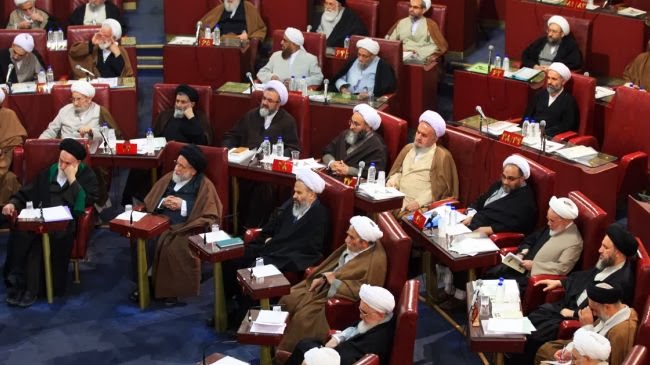Assembly of Experts
The Expert (Persian مجلس خبرگان رهبری, Majlis -e -e Rahbari Chobregan ) is a constitutional body of the Islamic Republic of Iran and has the task to choose according to Article 111 of the Iranian Constitution, the Supreme Leader (or the Supreme Leader ) and monitor. The 86 members of the Expert Council are reviewed by the Guardian Council for conformity to the Iranian Constitution and Islamic teachings, admitted to the polls and elected every eight years by the people.
History
First of Experts on 10 December 1982 was chosen. In contrast to the government in Tehran he met for its first meeting on July 13, 1983 first in Qom, and later in the former Senate of Iran. The first election period lasted until the election on 8 October 1990. Upcoming elections were held on 23 October 1998. The choice for the current fourth term of office took place on 15 December 2006 and was determined by the effective media attention and polarization between the ultra- religious Mohammad Taqi Mesbah Yazdi and the pragmatic Rafsanjani.
The expert advice is often confused with the Assembly of Experts, whose mission represented the elaboration and confirmation of the Iranian Constitution on September 12, 1979.
Candidates
The verified and approved by the Guardian Council candidates need as reputation, the " political and social " compliance with the Islamic Republic of Iran. Among the members are only mullahs with at least the religious title Hodschatoleslam, which are suitable for political and social leadership on the type 109 of the Constitution and have the capacity to provide legal opinions ( ijtihad ).
Tasks
The Expert Council meets every year for at least 5 days and then has the task of monitoring under Article 111 of the Constitution, the official leadership of the revolutionary leader and to review its legal obligations. In case of illness or in respect of its obligations of leadership to the revolutionary leader may be removed from his office expertise. In fact, this should be a moot point, as the revolutionary leader determines the half of the Guardian Council, and this makes the shortlist of candidates, the Council of Experts. The Expert has a seven-member " Information Service ", whose job it is to gather information about the Supreme Leader and prepare the meetings of the Expert Council.
On June 4, 1989, after the death of Khomeini, chose the expert Ali Chamene'i the new revolutionary leader. The necessary constitutional amendment was approved in a referendum on 28 July 1989, on hindsight.
In an unprecedented letter to the expertise demanded in August 2009, a gathering of some 700 former and current parliamentarians the dismissal of the Supreme Leader Ali Chamene'i. The deputies hold that the revolutionary leader must be the supreme authority for the actions of the police and militias after the Iranian presidential elections in 2009 responsible and therefore accountable. MEPs criticize the actions of the police and Basij militia in the last few weeks of the protests after the Iranian presidential elections in 2009 in the strongest and condemned the show trials, which are organized in a Stalinist manner against the opposition. Similarly, the now closed prison Kahrisak, were severely abused in the detained demonstrators and tortured to death in many cases is referred to as worse than the prisons of Abu Ghraib and U.S. Guantanamo.
Distribution of seats
The number of seats in the expert advice is given and also depends on the size of the provinces:










